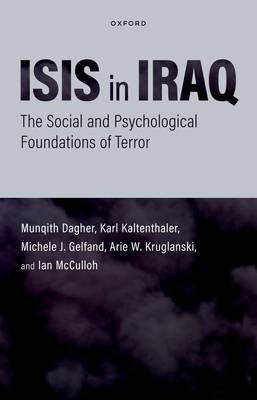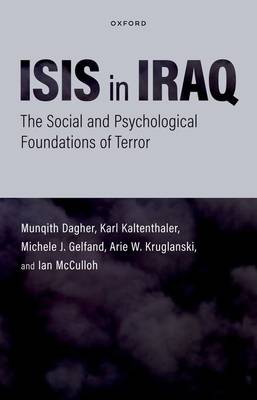
Door een staking bij bpost kan je online bestelling op dit moment iets langer onderweg zijn dan voorzien. Dringend iets nodig? Onze winkels ontvangen jou met open armen!
- Afhalen na 1 uur in een winkel met voorraad
- Gratis thuislevering in België vanaf € 30
- Ruim aanbod met 7 miljoen producten
Door een staking bij bpost kan je online bestelling op dit moment iets langer onderweg zijn dan voorzien. Dringend iets nodig? Onze winkels ontvangen jou met open armen!
- Afhalen na 1 uur in een winkel met voorraad
- Gratis thuislevering in België vanaf € 30
- Ruim aanbod met 7 miljoen producten
Zoeken
Isis in Iraq
The Social and Psychological Foundations of Terror
Munqith Dagher, Karl Kaltenthaler, Michele J Gelfand, Arie Kruglanksi, Ian McCulloh
Hardcover | Engels
€ 82,95
+ 165 punten
Omschrijving
The Islamic State in Iraq and Syria (ISIS) gained control over large swathes of Iraq in the summer of 2014 at a breathtaking rate. At the time many rightly wondered how ISIS was able to claim so much territory in the Sunni-dominated portion of Iraq so quickly. Just as unexpected, however, was the downfall of ISIS; by 2017, their hold on the region had crumbed with ISIS focusing on avoiding complete annihilation.
This book explores the social and psychological factors behind how ISIS was able to rise in Iraq, control most of it, and why most of that population eventually turned on it. Synthesized by some of the foremost experts on terrorism, the analysis is based on a unique array of public opinion data from surveys, focus groups, and interviews. The authors explain why some Iraqis acquiesced to ISIS while others opposed it, why ISIS lost the hearts and minds of Iraqi Sunni Arabs, and ultimately how this contributed to its battlefield defeats. The in-depth face-to-face interviews with ISIS members are a particularly rich source of data, supplementing empirical findings to draw lessons as to what individual and societal-level factors contribute to radicalization and what can be done to counter radicalization and support deradicalization.
This book explores the social and psychological factors behind how ISIS was able to rise in Iraq, control most of it, and why most of that population eventually turned on it. Synthesized by some of the foremost experts on terrorism, the analysis is based on a unique array of public opinion data from surveys, focus groups, and interviews. The authors explain why some Iraqis acquiesced to ISIS while others opposed it, why ISIS lost the hearts and minds of Iraqi Sunni Arabs, and ultimately how this contributed to its battlefield defeats. The in-depth face-to-face interviews with ISIS members are a particularly rich source of data, supplementing empirical findings to draw lessons as to what individual and societal-level factors contribute to radicalization and what can be done to counter radicalization and support deradicalization.
Specificaties
Betrokkenen
- Auteur(s):
- Uitgeverij:
Inhoud
- Aantal bladzijden:
- 272
- Taal:
- Engels
Eigenschappen
- Productcode (EAN):
- 9780197524756
- Verschijningsdatum:
- 23/05/2023
- Uitvoering:
- Hardcover
- Formaat:
- Genaaid
- Afmetingen:
- 162 mm x 237 mm
- Gewicht:
- 489 g

Alleen bij Standaard Boekhandel
+ 165 punten op je klantenkaart van Standaard Boekhandel
Beoordelingen
We publiceren alleen reviews die voldoen aan de voorwaarden voor reviews. Bekijk onze voorwaarden voor reviews.











